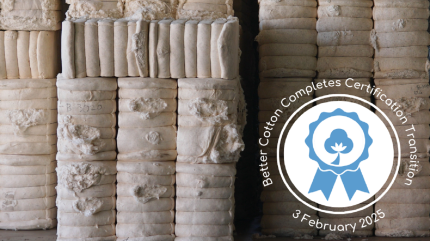
The organisation has delegated all decisions related to farm-level certification to external independent entities to enhance the integrity and objectivity of its established framework.
The transformation follows Better Cotton’s announcement last year, outlining its intent to shift into a certification programme. This move was driven by the need to align with new and emerging legislative requirements.
The EU Commission and European Parliament describe a certification scheme as a third-party verification process where all assessments of compliance and the granting of certification are carried out by an independent certification body.
Better Cotton certification head Tom Owen said: “For more than a decade Better Cotton has led one of the sector’s most robust and credible voluntary standard systems. The transition to a certification scheme and standardising third-party verification will not only strengthen our current approach but also enable us to continue driving meaningful industry-wide change.”
Under the previous model, Better Cotton used a combination of second-party assessments conducted by its team and third-party assessments as part of its assurance toolkit.
The final licensing decisions rested with the Standards and Assurance team, aiming to balance cost-effectiveness, accessibility, and credibility.
The new certification model will now complement the second-party monitoring methods within its network of farmer-centric organisations.
This thorough evaluation aims to identify instances of non-compliance and offer continuous oversight of operational practices. The valuable insights gathered play a key role in shaping capacity-building efforts that drive continuous improvements throughout the system.
Furthermore, Better Cotton said that all supplier and manufacturer members looking to procure Physical Better Cotton must now achieve certification against the Better Cotton Chain of Custody Standard.
This requirement is designed to enhance traceability throughout the supply chain and meet increasing regulatory expectations surrounding sustainability in global markets.
Later this year, Better Cotton plans to unveil a new product label that will enable retailers and brands using Physical Better Cotton to publicly commit to the principles upheld by Better Cotton. Further, the Better Cotton Mass Balance on Product Mark will be discontinued by May 2026.
To date, over 306,000kg of physical Better Cotton has been sourced by retailer and brand members from regions such as the US, Egypt, Uzbekistan, Spain, Greece, Tajikistan, Mozambique, Mali, China, Türkiye, India, Pakistan, and Tajikistan.
The organisation is also focusing on leveraging detailed data insights from its supply chain operations to further enhance transparency for all stakeholders involved.



